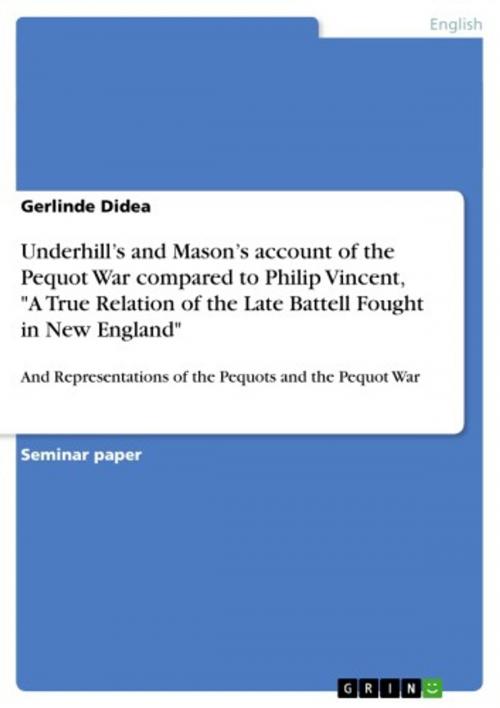Underhill's and Mason's account of the Pequot War compared to Philip Vincent, 'A True Relation of the Late Battell Fought in New England'
And Representations of the Pequots and the Pequot War
Nonfiction, Entertainment, Drama, Anthologies| Author: | Gerlinde Didea | ISBN: | 9783640260874 |
| Publisher: | GRIN Verlag | Publication: | February 4, 2009 |
| Imprint: | GRIN Verlag | Language: | English |
| Author: | Gerlinde Didea |
| ISBN: | 9783640260874 |
| Publisher: | GRIN Verlag |
| Publication: | February 4, 2009 |
| Imprint: | GRIN Verlag |
| Language: | English |
Seminar paper from the year 2007 in the subject American Studies - Literature, grade: 2, Johannes Gutenberg University Mainz, course: Seminar Fighting Words, 8 entries in the bibliography, language: English, abstract: In 1637, the English colonists had already had several encounters with the native inhabitants of New England. Most of them had taken place in a peaceful manner, with the exception of their encounter with the Pequots. Despite great efforts to negotiate for peaceful coexistence, the Pequots occasionally committed sudden assaults on the English colonists and thereby broke mutual agreements. The increasing Pequot aggressiveness soon exhausted the English endurance. As a consequence, the English decide to counterattack. John Mason, who commanded the Connecticut forces, focuses on the causes of war, while Captain John Underhill, commander of the Massachusetts Bay forces, relies on his theory of the successful massacre at God's interaction. As a contemporary narrator, Philip Vincent relates on information of people who witnessed the occurrences. The applied cruelty and systematic annihilation of almost the whole Pequot tribe, of course, raise the question about justification of the reasons. Is it providence, as Underhill interprets it, that the Pequots were so cruelly attacked? Is it an act of self-preservation as Mason concludes? Or did the Pequots deserve to be massacred for their tenacious aggressiveness and insult against the English as Vincent claims? It is a fact that Mason, Underhill as well as Vincent endorse and defend the massacre from their own point of view. Since all three narratives are from the first-person point of view, the interpretations of the Pequot massacre are biased and reflect individual reasons and emotions. Religious-based racism using the Christian bible as reference; desperation and anger are the sources of the cruelty of the massacre. The strong desire for vengeance and the quest for Puritan identity cause the English describe the Pequots as God's tool.
Seminar paper from the year 2007 in the subject American Studies - Literature, grade: 2, Johannes Gutenberg University Mainz, course: Seminar Fighting Words, 8 entries in the bibliography, language: English, abstract: In 1637, the English colonists had already had several encounters with the native inhabitants of New England. Most of them had taken place in a peaceful manner, with the exception of their encounter with the Pequots. Despite great efforts to negotiate for peaceful coexistence, the Pequots occasionally committed sudden assaults on the English colonists and thereby broke mutual agreements. The increasing Pequot aggressiveness soon exhausted the English endurance. As a consequence, the English decide to counterattack. John Mason, who commanded the Connecticut forces, focuses on the causes of war, while Captain John Underhill, commander of the Massachusetts Bay forces, relies on his theory of the successful massacre at God's interaction. As a contemporary narrator, Philip Vincent relates on information of people who witnessed the occurrences. The applied cruelty and systematic annihilation of almost the whole Pequot tribe, of course, raise the question about justification of the reasons. Is it providence, as Underhill interprets it, that the Pequots were so cruelly attacked? Is it an act of self-preservation as Mason concludes? Or did the Pequots deserve to be massacred for their tenacious aggressiveness and insult against the English as Vincent claims? It is a fact that Mason, Underhill as well as Vincent endorse and defend the massacre from their own point of view. Since all three narratives are from the first-person point of view, the interpretations of the Pequot massacre are biased and reflect individual reasons and emotions. Religious-based racism using the Christian bible as reference; desperation and anger are the sources of the cruelty of the massacre. The strong desire for vengeance and the quest for Puritan identity cause the English describe the Pequots as God's tool.















